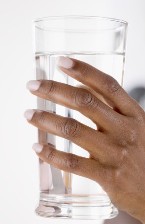Drinking Enough Water Facts
and Recommendations
Note: As an Amazon Associate I earn from qualifying purchases.
How do you know if you are drinking enough water? Facts are unclear and often contradictory, depending on who you ask.
The following is a list of insights and recommendations from notable sources that might provide some clarity.
9 Drinking Enough Water Facts
1. Daily water loss
Every day we lose water through breathing, perspiration, urination and defecation.
According to the Mayo Clinic, the average urine output for adults is about 1.5 liters daily. We lose an additional liter of water a day through breathing, sweating and bowel movements.
Eating fresh, whole foods accounts for about 20 percent of total fluid intake. Thus, they say the average healthy adult needs to drink about two liters of water daily to replace lost fluids.
2. Recycled water in the body
Dr. F. Batmanghelidj, author of Your Body’s Many Cries for Water and Water for Health, for Healing, for Life says the same thing in a different way.
He says the body recycles the equivalent of forty thousand glasses of water every day just to maintain normal physiological functions.
During this process of water recycling and metabolism, the body becomes short of about six to ten glasses of water, or more, depending on individual factors and environmental conditions.
3. Drink eight glasses a day approach
The most common medical recommendation for fluid replacement is to drink six to eight 8-ounce glasses (about 2 liters) of fluid a day.
However, this approach is not supported by scientific evidence and does not take into account individual needs. Many people still use this basic guideline for drinking enough water. Facts are evident, though, that six to ten glasses may not be enough for everyone.
4. Drink half your body weight in ounces
For the average healthy adult living in a moderate climate, the water replacement approach recommended by many top water experts is to drink half your body weight in ounces of water daily.
For example, if you weight 200 lbs., you would want to drink 100 ounces (about 3 liters) of water daily. This approach takes into consideration differences in weight, which makes more sense. However, other factors may increase water needs.
5. Water needs vary from person to person
Daily water intake varies depending on your weight, age and gender, your levels of activity and exercise, your local weather conditions, your health condition and if you are pregnant or breast-feeding.
6. Thirst and urine markers
The Mayo Clinic suggests that regardless of which fluid replacement approach you take, a good way to assess your hydration level is to pay attention to your perception of thirst and the color of your urine.
They advise that if you rarely feel thirsty and if you produce about 1.5 liters or more of odorless, colorless or slightly yellow urine a day, your intake may be adequate.
7. Elderly people lose their thirst sensation
Relying on feelings of thirst, however, is not an accurate gauge for the elderly. According to Dr. F. Batmanghelidj, as we grow older, "we lose our thirst sensation and do not recognize that our body is thirsty.”
He notes that dry mouth is not an accurate sign of water shortage in the body because when we feel thirsty, the body is already dehydrated.
8. No water storage system in the body
According to Dr. Batmanghelidj, the human body has no water storage system to provide usable water when the body experiences excess water loss or lack of water intake.
This is one of the primary reasons it is important to drink water at regular intervals throughout the day.
9. Other fluids do not replace water
Even though other beverages will replenish some of the fluids lost in the body, nothing replaces the benefits of pure water. Batmanghelidj notes that water and fluids are two different things when it comes to body chemistry. He says the body needs water and “nothing substitutes for water.”
Milk, juices, soda, coffee, tea do not provide the same benefits as water. In fact, beverages containing alcohol and caffeine are considered diuretics and will cause additional water loss in the body.
References for Drinking Enough Water Facts
Water for Health, for Healing, for Life: F. Batmanghelidj, MD; 2003
MayoClinic.com: Water: How much should you drink every day?
Return from Drinking Enough Water Facts to Drinking Enough Water
If you would like to reproduce or republish this article or any other article on this site, feel free to do so but please include a reference or link to the article at WaterBenefitsHealth.com.
Sign Up for Our Monthly
Newsletter
Visitor Comments
"This was the best and most straight forward info on the net yet. I asked a question and got an answer that made sense. Thank you so much!" - Linderlinder
FINALLY!!! I have been wondering about this for years with no 'solid' answer. This is exactly what I've been wanting to know! Thank you for this share..." by Andy
"Thank you for the information, Nancy. I appreciate it. Your article and findings are very helpful, referring to dehydration." - Carolyn
"Lemon water is one drink both my wife and I can't drink. It upsets our stomachs. We are in our sixties and in very good health—well, better health now that we drink about 2 liters plus of water each day. It has made so much difference to our digestive systems and recovery every day. Thank you for your website and effort." - Rod



